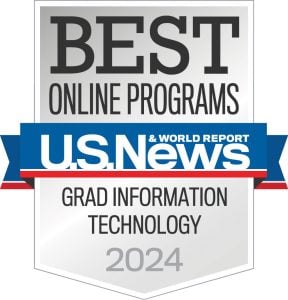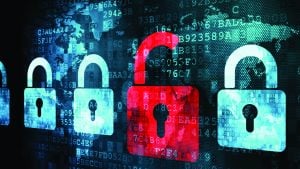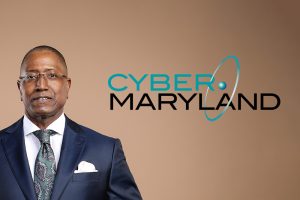
Cybersecurity Program Overview

Cybersecurity ranked #1 for Information Technology by U.S. News & World Report
As part of this U.S News & World Report #1-ranked cybersecurity online, part-time program, you will develop the skills needed to protect the confidentiality, availability, and integrity of data, preserve and restore systems, and develop risk management skills to anticipate and avoid cyber threats.
Access to our state-of-the-art computing facilities and technologically advanced virtual classrooms to ensure thoughtful and insightful engagement with instructors and classmates. Take courses built for our modern world, offering the latest techniques in cybersecurity, including Security Engineering, Applied Machine Learning, and Reverse Engineering and Vulnerability Analysis. We offer a unique opportunity to complete a Capstone project or conduct research. Take a look at some innovative research projects and presentations completed by our students.
Once part of the EP community, you’ll build your professional network and enhance your knowledge with access to the resources and expertise of Johns Hopkins University and the Applied Physics Laboratory.
Whether your career is in information security, IT, risk management and compliance, or governance, our Cybersecurity program can help you:
- Increase your marketability by learning cutting-edge industry trends, knowledge, and skills through coursework designed by industry experts.
- Apply skills and knowledge when assessing a corporation’s security risks and formulating technical recommendations in the areas of both hardware and software.
- Demonstrate proficiency in the four major areas of cryptology: encryption, hash functions, signature schemes, and authentication.
Master’s Degree Focus Areas
A focus area must be selected. While required to narrow your study, your focus area will not appear on your degree.
- Analysis: Gain an understanding of security issues such forensic patterns, intrusion detection rules, ethical hacking techniques, and reverse engineering.
- Assured Autonomy: Focus on the complexities inherent in autonomous systems and the multifaceted and multilayered approaches necessary for the continual assurance of these Learning-Enabled, Cyber Physical Systems (LE-CPSs).
- Cyber Operations: The study of the employment of cyber capabilities where the primary purpose is to achieve objectives in or through cyberspace. Such operations include computer network operations and activities to operate and defend cyber systems.
- Networks: Study the security of clouds, protocols, data communications, covert channels, wired and wireless networks, and the internet.
- Space Cyber: The study of the employment of cyber capabilities to identify and mitigate cyber threats to the unique aspects of space systems via a comprehensive and unified engineering approach combining open systems architecture, model-based systems engineering (MBSE), and reverse engineering analysis aimed at efforts to operate, protect, and defend space assets and services.
- Systems: Explore the security of computing devices ranging from typical architectures to embedded and real-time systems. Study topics like secure system design, authentication solutions, and application software.
FOCUS AREA REQUIREMENTS
Programs
We offer three program options for Cybersecurity; you can earn a Master of Science in Cybersecurity or a Graduate or Post-Master’s Certificate.
Cybersecurity Courses
Explore prerequisite, core, and elective courses as well as courses necessary to complete each focus area. All courses are taught by subject-matter experts who are executing the technologies and techniques they teach. For exact dates, times, locations, fees, and instructors, please refer to the course schedule published each term.
Proficiency Exams
A proficiency exam is available in Cybersecurity. If you have not completed the necessary prerequisite(s) in a formal college-level course but have extensive experience in these areas, may apply to take a proficiency exam provided by the Engineering for Professionals program. Successful completion of the exam(s) allows you to opt-out of certain prerequisites.
Program Advisors
Knowledgeable and supportive advisors are here to help guide you through the program. Take a look at our specially designed advisor page to get answers to your questions about admissions, prerequisites, and so much more.
Program Contacts
-
 Email:[email protected]
Email:[email protected]
-
Tony Johnson
Program Manager Artificial Intelligence, Program Manager Computer Science, Program Manager Cybersecurity, Program Manager Data Science, Program Manager Information Systems Engineering Email:[email protected]
Email:[email protected]
-
Email:[email protected]
-
Email:[email protected]
Tuition and Fees
Did you know that 78 percent of our enrolled students’ tuition is covered by employer contribution programs? Find out more about the cost of tuition for prerequisite and program courses and the Dean’s Fellowship.
“It was fantastic. The courses were interesting and challenging. The program is incredibly flexible, especially the online courses. I was able to complete my degree while maintaining my job. Overall, the quality of education and program flexibility were absolutely fantastic. I have already recommended the EP program to friends, and two are currently in JHU Master’s programs that can be completed online. ”
Why Hopkins?
Wondering how to get a master’s in cybersecurity? It all starts here, at Johns Hopkins.
Engineers See the World Differently - Watch our video to revisit the inspiration that sparked your curiosity in science and engineering.

Multiple Ways to Learn - Take courses completely online, onsite, or a hybrid of online and onsite. We also offer virtual live—a synchronous, live instruction option that allows you to take a course at a scheduled time, with your classmates, but in your own space. Learn More

Optional Independent Study Available - This course permits graduate students in cybersecurity to work with a faculty mentor to explore a topic in-depth or conduct research in selected areas. Learn More
“I appreciated the flexibility of the online courses was extremely useful as I was not able to relocate in order to complete my degree. I also liked the chance to do an independent study semester, this was a great opportunity to grow and do some research in the field. ”
Cybersecurity FAQs
Our post-graduate cybersecurity certificate program is designed to meet the needs of students who already have a master’s degree and are looking for further expertise. Our degree program is designed for students who do not have a master’s degree and are interested in diving deep into the field to gain a deeper understanding.
Classes are offered in a variety of ways (online, in-person, hybrid (online and in-person), and synchronous live) to accommodate your learning style and schedule. We also provide students up to five years to complete their degrees, taking semesters off or taking two courses at a time if it works with their workload. A supportive environment and program advisors help you navigate through class selection and career planning throughout your time in the program.
Prerequisite course requirements must be completed at a regionally accredited university/college and you must have received a B– grade or higher. You can also take your prerequisites with us at Johns Hopkins. However, if you are transferring a course it must be a graduate-level course, the course cannot have been used to complete another degree, and your 5-year clock of completing your degree begins on the day you enroll in your first graduate class (including any transfer graduate courses).
Yes, you can apply as a non-degree-seeking student. If you are not looking to complete a second Master’s in Cybersecurity but still wish to advance your expertise in the field, consider the cybersecurity certificate program offered by Engineering for Professionals. Learn more about the program here.
Upon graduation, many alumni with a master’s in cybersecurity earn an average salary upwards of $102,000.
Academic Calendar
Find out when registration opens, classes start, transcript deadlines and more. Applications are accepted year-round, so you can apply any time.


